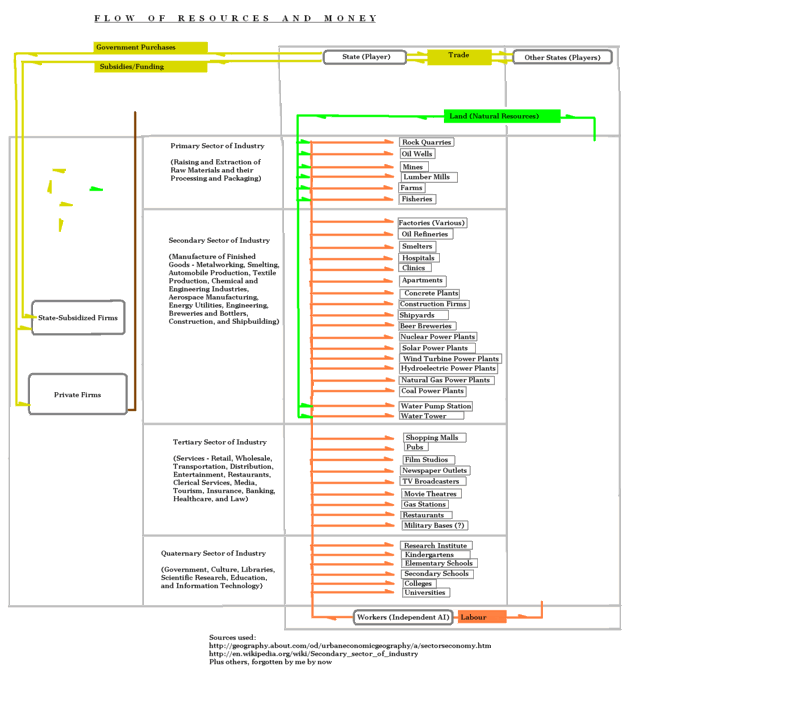 Yes? Discuss. :)
Yes? Discuss. :)
Economics
My last thread was cluttered, sorry. This one will have pictures (yay!) Hopefully this thread will be more interesting.  Yes? Discuss. :)
Yes? Discuss. :)
 Yes? Discuss. :)
Yes? Discuss. :)
Have you checked out the models used by Economists?
e.g. http://en.wikipedia.org/wiki/Circular_flow (Circular flow of money)
e.g. http://en.wikipedia.org/wiki/Circular_flow (Circular flow of money)
Yep, this is what it's based on. But it doesn't take a wikipedia article to show that.
[edit] Err.. yes, I've read this before in economics 101 before I believe, and previously in my spare time.
How can I expand that to make it more complete?
[edit] Err.. yes, I've read this before in economics 101 before I believe, and previously in my spare time.
How can I expand that to make it more complete?
Quote:
Original post by polyfrag
Yep, this is what it's based on. But it doesn't take a wikipedia article to show that.
[edit] Err.. yes, I've read this before in economics 101 before I believe, and previously in my spare time.
I meant :
There are many models of money flow in economic literature. For example, the one mentioned in the wiki. (and others like : http://en.wikipedia.org/wiki/Ramsey_model )
It might be worthwhile to check those models out.
Could this model be used as the basis for an economic simulation? (And be expanded?)
Quote:
Original post by polyfrag
Could this model be used as the basis for an economic simulation? (And be expanded?)
Depends on what you want to achieve I guess. I think it might be better to start at the root : why are workers purchasing?
In a virtual world where we don't need food, shelter, clothes etc, I think having "factories" serve no purpose.
Well workers have intrinsic biological needs (e.g., needing a certain amount of food) and need some comforts for life (e.g., housing). So at a bare minimum they need to purchase these things to survive.
[edit] Umm... the virtual workers do need goods to survive, I don't know about a virtual world where the workers don't need any goods. That is some deep philosophical stuff.
[edit] Umm... the virtual workers do need goods to survive, I don't know about a virtual world where the workers don't need any goods. That is some deep philosophical stuff.
Quote:
Original post by polyfrag
Well workers have intrinsic biological needs (e.g., needing a certain amount of food) and need some comforts for life (e.g., housing). So at a bare minimum they need to purchase these things to survive.
How are you planning to implement the worker's consumption behavior in the game?
Are you going to use one of the many economic models for consumption?
Quote:
Original post by polyfrag
[edit] Umm... the virtual workers do need goods to survive, I don't know about a virtual world where the workers don't need any goods. That is some deep philosophical stuff.
There are online games meant for chatting that do not have "survival requirements". Also, there are games were players can play indefinitely without purchasing any virtual goods.
I have this feeling I am misunderstanding your point though...lol.
The players aren't the workers, the workers are AI. The players control governments.
The consumption behaviour involves a 'happiness' meter. The workers like to max out their happiness meter by consuming goods (and they need a certain amount of food and housing to max it out). But to get goods, they need money. To get money, workers need to work. Therefore, they will work wherever they are offered money, and will buy goods wherever they are sold. They will prefer to buy cheap and get paid well, to maximize happiness. Happiness naturally runs down with time and so they need to replenish it regularly by consuming. Their activities will consist of the cycle of going to places where they can buy goods, consuming them (at a certain rate per time), until they run out of money, then going to places where they can work to get money, working (getting money at a certain rate), until their happiness runs low, then going to consume over again.
The consumption behaviour involves a 'happiness' meter. The workers like to max out their happiness meter by consuming goods (and they need a certain amount of food and housing to max it out). But to get goods, they need money. To get money, workers need to work. Therefore, they will work wherever they are offered money, and will buy goods wherever they are sold. They will prefer to buy cheap and get paid well, to maximize happiness. Happiness naturally runs down with time and so they need to replenish it regularly by consuming. Their activities will consist of the cycle of going to places where they can buy goods, consuming them (at a certain rate per time), until they run out of money, then going to places where they can work to get money, working (getting money at a certain rate), until their happiness runs low, then going to consume over again.
This topic is closed to new replies.
Advertisement
Popular Topics
Advertisement
Recommended Tutorials
Advertisement









